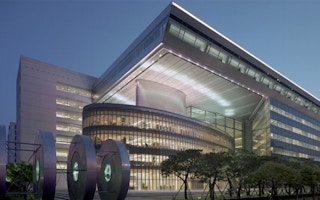The Korea Development Bank (KDB), South Korea’s state-funded financier of domestic and overseas industrial projects, could be moving away from coal financing as uncertainty builds over the financial viability of coal-fired power projects domestically and overseas.
To continue reading, subscribe to Eco‑Business.
There's something for everyone. We offer a range of subscription plans.
- Access our stories and receive our Insights Weekly newsletter with the free EB Member plan.
- Unlock unlimited access to our content and archive with EB Circle.
- Publish your content with EB Premium.
KDB’s chairman, Dong-geol Lee, said last Friday (16 October) that the bank would no longer provide financial support for coal-fired power stations if the Korean government and national utility Korea Electric Power Corporation (Kepco) ended coal power exports.
His comments, made at the Korean National Assembly, were in response to concerns voiced by the political affairs committee that investments in coal power in Korea and overseas would lose value over time, and become stranded assets.
A member of the National Assembly’s political affairs committee referred to a study that predicted that the utilisation rate of the KDB-backed Samcheok coal-fired power plant would fall by half over the next 10 years, leaving the plant in serious financial trouble.
Korea is one of the world’s biggest financiers of overseas coal power, but its government’s recently stated ambition to be a net zero carbon nation by 2050, and Kepco’s signalled shift away from coal, announced following a series of protests from environmentalists and shareholders, have put pressure on other players in Korea’s financial system to do the same.
“
Korea Development Bank is experiencing the reality of the energy transition with coal power plants it has supported in financial trouble.
Joojin Kim, managing director, Solutions For Our Climate
Lee told the National Assembly’s political affairs committee: “If the government and Kepco do not export coal power plants, we will not provide financial support,” according to a report in Maeil Economic Daily.
KDB has not responded to questions from Eco-Business on whether the chairman’s statement will mean an official withdrawal from overseas coal funding.
“Korea Development Bank is experiencing the reality of the energy transition, with coal power plants it has supported in financial trouble and debt exposure to fossil fuel companies like Doosan Heavy Industries & Construction increasing in the billions in 2020 alone,” said Joojin Kim, managing director of Korean environmental group Solutions For Our Climate.
Power plant builder Doosan, which is heavily in debt, has been repeatedly bailed out by KDB. The company, which has just been awarded a contract to build the controversial Vung Ang 2 coal-fired power plant in Vietnam, was sold by parent company Doosan Group last month.
“Korea Development Bank should consider this as an opportunity to rethink its energy industry strategy and limit its exposure to collapsing coal power plant manufacturing companies,” Kim told Eco-Business.
KDB adopted the Equator Principles, a framework for assessing the environmental and social risk of infrastructure projects, in 2017, and pulled out of the financing consortium for the controversial Adani Carmichael coal mine in Australia a year later.
Though the company does not have a climate strategy, KDB recognises climate change as a “challenge” in its overarching strategy, according to a report by E3G.










